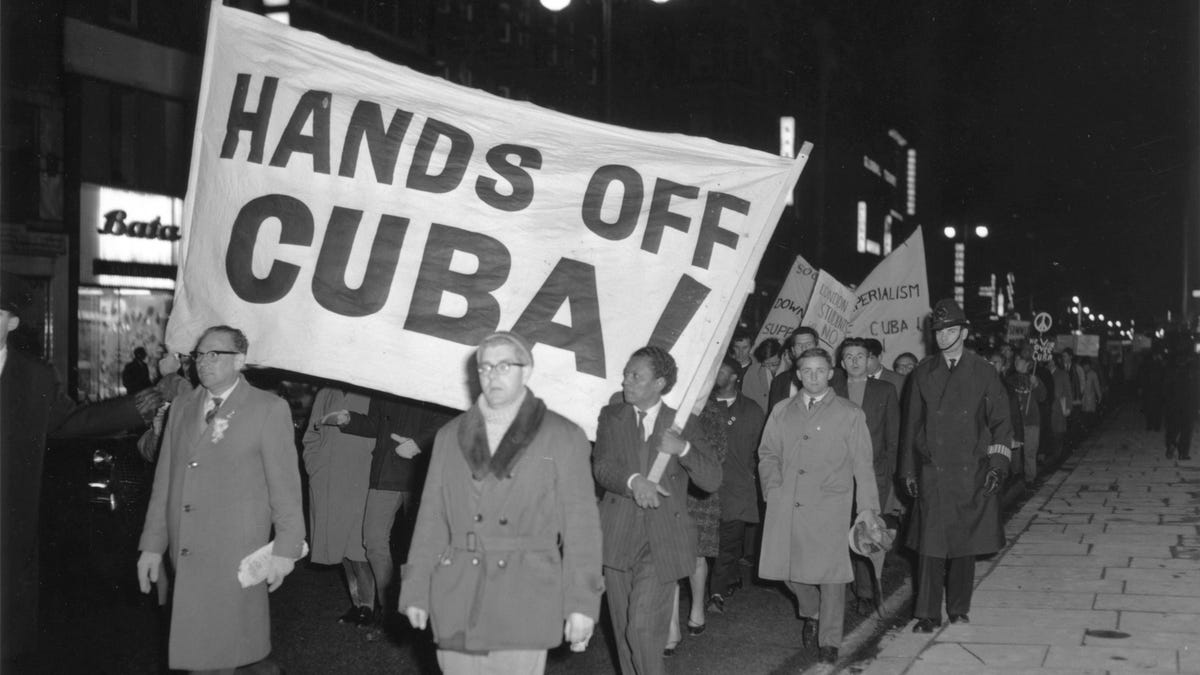
LONDON - OCTOBER 28, 1962: (EDITORIAL USE ONLY) (FILE PHOTO) Members of the Campaign for Nuclear Disarmament (CND) march during a protest against the U.S.'s action over the Cuban missile crisis October 28, 1962 in London, United Kingdom. Former Russian and U.S. officials attending a conference commemorating the 40th anniversary of the missile crisis October 2002 in Cuba said that the world was closer to a nuclear conflict during the 1962 standoff between Cuba and the U.S., than governments were aware of. (Photo by Getty Images) (Getty Images)
For 53 years, I have wondered if this day would ever come. And now that it has, I can’t help thinking of my mom and dad. I’m grateful they have lived long enough to see it. I think of my uncle Emilio who has died in Cuba without my getting to know him better, except for one visit to the U.S. where we fished and talked about this day.
I was born during the Cuban revolution in a place called Guanabacoa and left because of the revolution that my parents feared, not for them, but for my brothers and me. I never got to know my grandparents even though they lived and died just 90 miles away.
The table is set for what is one of the most historic foreign policy decisions in half a century. Where it goes from here will be determined by those it affects, from Iowa’s corn fields to Washington D.C. and Guanabacoa, Cuba.
My older brother Rudy had it worse. He was smuggled out of Cuba by the Catholic Church and lived alone and frightened in a convent in Arizona until my mom could muster the nickels and dimes she saved up to go by train from Miami to Arizona to retrieve him.
My story is not too different from that of hundreds of thousands of others like me. We call ourselves refugees — "political refugees" is a nomenclature used with pride by Cuban-Americans to separate our experience from those of others.
So what do we say on this day when President Obama has undone 53 years of U.S. policy toward Cuba? The very notion of normalized relations with that very place we were all trained to hate seems abhorrent to every fiber in our bodies. Yet, we – like most Americans – tussle with its meaning.
The Cuba story is not just our story. It belongs to all of us. All Americans have learned about or lived through the Cuban Missile crisis, the Bay of Pigs, the Elian Ordeal, the Mariel Exodus. All Americans can think back to a time when the name Fidel Castro was only equaled on today’s terms by ISIS.
That is why this story matters. President Obama is thumbing his nose at history. He isn’t turning a page. He’s preparing to write an entirely new book.
When the president says he will reestablish diplomatic ties with Havana and that in the coming months he will open an embassy in Havana to carry out high-level exchanges and visits between our two governments as part of the normalization process, I’m left awestruck. And so are millions of people around the world.
Now the reaction: Whether openly or behind closed doors, conservative Republicans from Midwestern agricultural states will applaud the move as a way to finally be able to compete in a market they have been excluded from in the past.
Social conservatives and those with an eye on the presidency will use it as a perfect wedge issue to all but guarantee a GOP win in Florida by stoking the anger of Cuban-American voters who will now finally have a real reason to distinguish between the parties and show up at the polls.
Democrats will likely embrace the president’s decision and so will the international community.But what about the Cuban community?
Here is how that will break down. Cuban-Americans who came to the U.S. during the first and second waves in the 1960s and 70s will affirm their stance on Obama as ‘a communist’ and work their tails off to elect a Republican. Cubans who have come more recently and who, unlike the first group, routinely return to Cuba to visit relatives, will tend to back the normalization of relations.
Demographically, it breaks down quite easily. The younger Cuban demographic will tend to agree with President Obama’s decision, while the older guard will be more apt to disagree.
The table is set for what is one of the most historic foreign policy decisions in half a century. Where it goes from here will be determined by those it affects, from Iowa’s corn fields to Washington D.C. and Guanabacoa, Cuba.








































